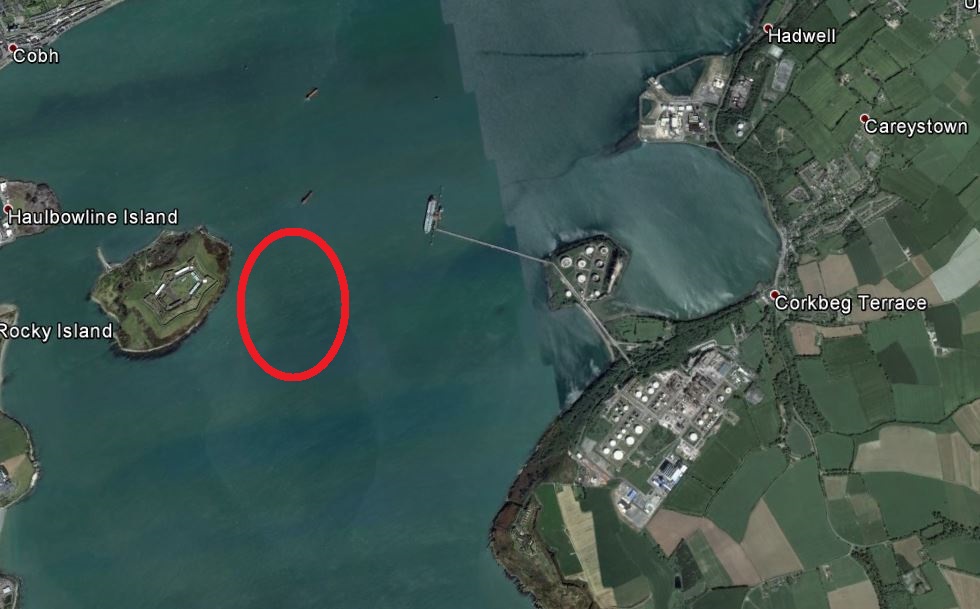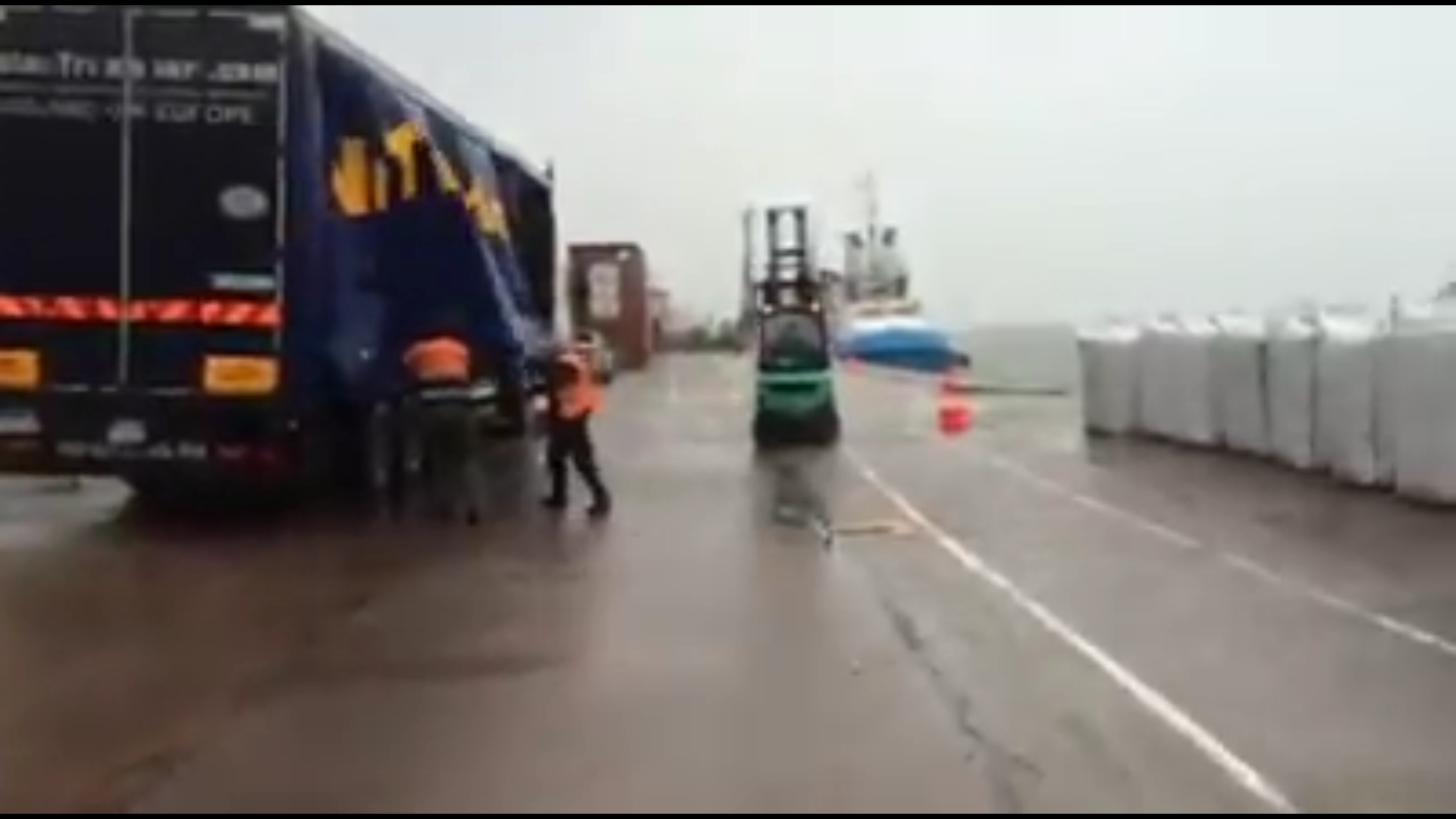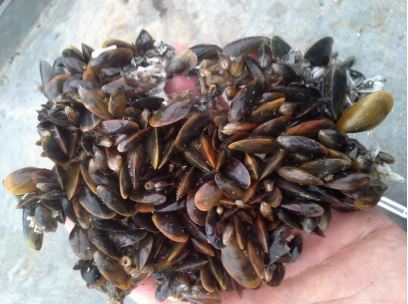In Nov/Dec 2015 mussel dredgers went to work in an area of Cork Harbour. An industry with a dubious reputation.... Will it be allowed continue?


Dredged Area – (Approx) Ringed in red.
Mussel Dredging – Cork Harbour
Firstly lets establish the facts:
In late November 2015 some mussel dredgers appeared in Cork Harbour. They set about working dredging mussels from a mussel bed located near Spike Island.
The boats appeared to work around the clock, dredging and disgorging their catch unto the deep water quay in Cobh. The mussels, by then packed into 1 ton bags, were loaded into curtainsider artic trailers and were shipped out. In the short time witnessed, eight artic loads were taken away. That would be approximately 20 tons each – 160 tons in the short time we witnessed. The boats appeared to work through the night at times during their operation. We do not know yet the tonnage that was extracted over the duration of the dredging.
Weather condition that first weekend were horrendous. The boats operated in stormy conditions with winds gusting over 60mph.
The dredging eased up around mid-week and was finished completely on or around December 7.
Many people raised concern about the dredging. The longer the dredging continued and the industrial nature of the work the more questions were being raised.
You see a video of the pier here: form SailCork.com:
https://www.facebook.com/sailcork/videos/10153775110523114/

Dredgers operating in stormy conditions (Still Taken from Sail Cork video.)
Dredging aftermath
We have never witnessed mussel dredging in Cork Harbour before. Certainly dredging of this magnitude has not been carried out before. The industry has somewhat of a dubious reputation and we would have concerns about the ecological impact of such dredging.
The Sea Fishery Protection Authority (SFPA) would have some role in policing mussel dredgers so we contacted them. It would appear that their role is only minor. They should be notified that dredging would take place and they should be notified how much mussel has been removed. They do not have a role in authorising the dredging in the first place. That role is carried out by the Department of Agriculture, Food and the Marine (DAFM). We contacted DAFM. We were referred to the departments press office. We submitted an email to the department outlining the queries we had:
- Is there a seed mussel dredging season?
- Was there an assessment of the quantity of mussels in place in the area that was dredged? (East/SE of Spike Island)
- Is there control/regulation/a limit to the amount of mussels that can be extracted from the area being dredged?
- Is there any impediment for boats to dredge in other areas of the harbour (other than normal shipping channel rules etc.)?
Just about four weeks later we received a reply from DAFM:
The text in full:
“Mussel seed fishing is generally managed on a seasonal basis. The Minister opened the 2015 autumn seed mussel fishery in the exclusive fishery limits of the State on 5 September 2015, the date proposed by the Bottom Grown Mussel Consultative Forum. The Forum, established in 2009, makes recommendations to the Minister on various aspects of the management of the fishery, including proposing opening and closing dates of the fishery. The Department does not have a role in assessing any fish stock.
In making his decision, the Minister took into consideration the recommendations from the Forum, technical advice received from Bord Iascaigh Mhara, including survey reports published on BIM’s website, and scientific advice received from the Marine Institute regarding the fishery.
Designated conservation sites, Natura 2000 areas, remained closed under Fisheries Natura Declaration No. 2 of 2014. The fishery closed on 9 December 2015.
When the Minister opens a seed mussel fishery, fishing boats holding a valid authorisation to fish for seed mussel are allowed to fish for seed within the exclusive fishery limits of the State, except for in Natura areas closed under Fisheries Natura Declaration No. 2 of 2014.
A mussel seed authorisation specifies the quantity of seed that may be fished by the sea-fishing boat, where it is to be re-laid, together with other regulatory requirements. Fishermen are responsible for compliance with rules and regulations governing navigation and other aspects of fishing boat operations.”

Seed Mussel Dredging
Dredging for mussels is an industry that has a dubious reputation in terms of its environmental impact. The practice involves dredging (dragging a metal dredge across the seabed) small immature mussels (spat) from the seabed and transporting them to a calm water area. In this area the “seed” mussels are spread on the bottom and are dredged up again when they reach a marketable size.
It is our understanding that seed mussels are usually away from the established mussel beds and are the result of spawning activity on large mussel beds. The “seed” beds are located by surveys of areas and are harvested before winter storms can wash them away or before the seed beds are predated on by crustaceans and fish. Seed mussel beds are an important food source in the ecosystem where they exist.
The mussels are usually exported to Holland or Northern Ireland. The Bottom Grown Mussel business is different from the usual Rope Grown Mussel that we are familiar with in bays around the country.
Mussel dredging has a dubious reputation. It is an industry that is mainly located in the east coast. Commentators have no difficulty plotting the demise of quality angling along the east coast with the exploitation of mussel beds off the east coast. It would seem to make sense. If you take a large quantity of mussels from an area where you do not know how many mussels exist; there is a good chance of there not being enough mussels to repopulate the area. If you remove a food source for sea life then the sea life will disappear.
Bord Iscaigh Mhara (BIM), the Irish Sea Fisheries Board, conduct sampling studies of seed mussel each year. From what I can see these studies are carried out in the east coast region and in their latest report there was no indication that there was a study carried out in Cork.
http://www.bim.ie/our-publications/aquaculture/
It would appear that regulation and control of the industry is largely the responsibility of the industry itself with cursory reporting to the SFPA and DAFM. Authorisations to fish are issued on the advice provided by the industry itself and BIM.

Cork Harbour – Areas of conservation and protection
So where does this leave Cork Harbour and mussel dredging?
- The Autumn season for mussel seed dredging is variable. The Autumn season can be assumed to be Mid-September to Early December.
- There was no stock nor environmental impact assessment carried out before dredging.
- The amount of mussel removed by dredge is controlled by the overall limits set out by DAFM each year.
- The Dredgers can operate where they wish within the harbour (within limits of safe pilotage) once the area is not a deemed a conservation area (Natura 2000 Area) although sometimes these areas can be dredged with permission and agreement.
So to put it simply it would appear that almost anywhere there is a mussel bed in Cork Harbour it is fair game to these dredgers to clean out totally of seed mussel regardless of whatever impact this has on the harbour.
There is some protection for some shoreline areas within the harbour. Cork Harbour has a few Special Area of Conservation (SAC) and Special Protection Areas (SPA). These area are largely to do with bird habitat. There is no protection for mussel beds in deeper water.
It would appear from the reply received from the DAFM that mussel dredging in Cork harbour can continue largely unchecked or unhindered.

Destructive fishing… A dredge wrecks the bottom!
What questions remain?
- Is the dubious reputation of Seed Mussel Dredging warranted?
- Is it the case that many areas in the east coast are “no longer viable” due to overfishing and ecosystem destruction?
- Is the demise of fish stocks on the East Coast linked to the removal of mussel beds? Is this the future we want for Cork Harbour?
- How can dredging be allowed continue without an environment impact statement nor a stock assessment?
- Do the business interests of a small number of Seed Mussel Dredgers supersede the wellbeing of our harbour biodiversity?
- Does destructive dredging fit with the ethos of our harbour as a centre of science, study and tourism?
- How can we be sure that our mussel beds are not being totally wiped out in their entirety?
- How can we get our concerns heard and get action taken before our harbour becomes fair game for destructive fishing practices?
- Is there interest and concern from anglers, commercial fishermen, tourism, science and other stakeholders to attempt get this dredging stopped in the future?
Cork Harbour awaits our action!

Seed Mussel


